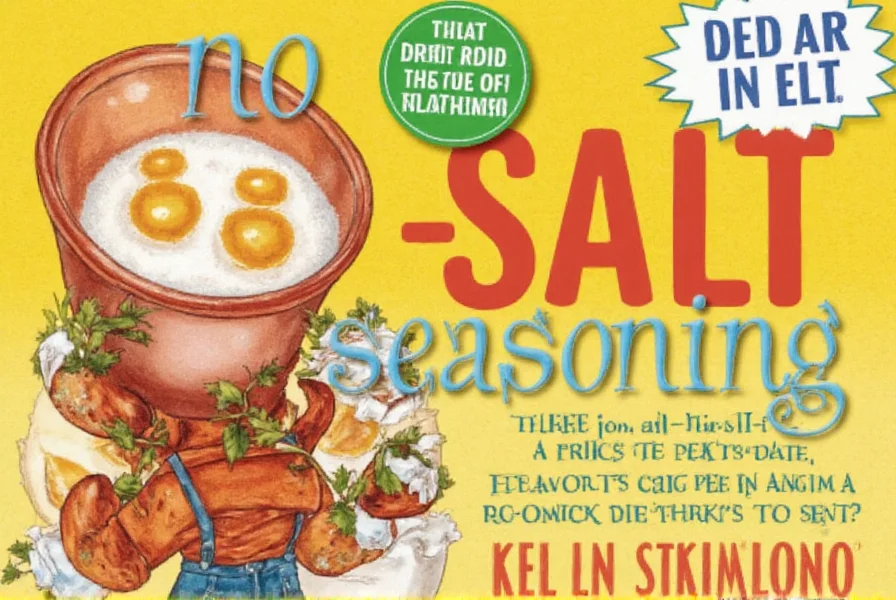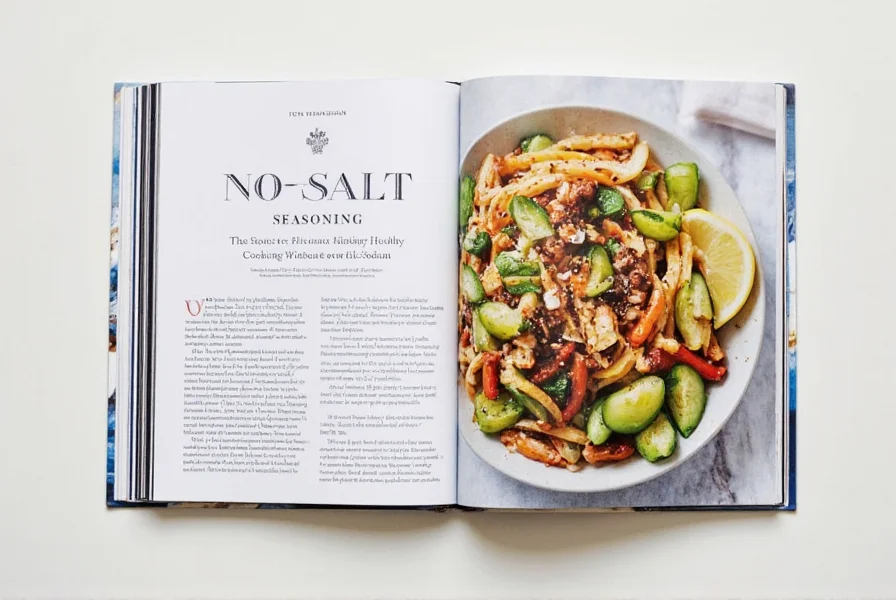No-Salt Seasoning: The Secret to Flavorful, Healthy Cooking Without the Sodium
Spice up your kitchen without spiking your blood pressure! Whether you're a culinary pro or just starting out on your flavor journey, no-salt seasoning is a game-changer. This article dives deep into everything you need to know about salt-free seasonings — from their health benefits and flavor profiles to how to use them like a pro.
We’ll also walk you through our top picks for no-salt blends, compare popular options, and share expert tips on cooking with these magical spice mixes. Let’s get seasoned — minus the salt!
Table of Contents
- What Is No-Salt Seasoning?
- Health Benefits of Going Salt-Free
- How No-Salt Seasonings Deliver Big Flavor
- Top 5 No-Salt Seasoning Products Reviewed
- Buying Guide: How to Choose the Right Blend
- Pro Tips for Using No-Salt Seasoning Like a Chef
- Common Mistakes to Avoid When Going Salt-Free
- Conclusion
What Is No-Salt Seasoning?
No-salt seasoning refers to any blend of spices, herbs, and aromatics that enhances flavor without adding sodium chloride (table salt). These mixes can include ingredients like garlic powder, onion powder, paprika, black pepper, dried herbs (like thyme or oregano), citrus zest, chili flakes, and more.
The idea isn’t just to mimic salt — it’s to create bold, balanced flavors using natural ingredients that bring depth and complexity to your meals.

Health Benefits of Going Salt-Free
If you're watching your heart health or managing high blood pressure, cutting back on sodium is one of the most impactful dietary changes you can make. The American Heart Association recommends no more than 2,300 mg of sodium per day — ideally aiming for 1,500 mg for those at risk of hypertension.
- Reduces risk of high blood pressure
- Lowers strain on the cardiovascular system
- Promotes better kidney function
- Encourages mindful eating and appreciation of whole foods
How No-Salt Seasonings Deliver Big Flavor
Salt amplifies flavor by suppressing bitterness and enhancing sweetness, sourness, and umami. But no-salt seasonings work differently — they rely on layers of taste:
- Umami boosters: Mushrooms, nutritional yeast, soy sauce alternatives (like coconut aminos)
- Aromatic enhancers: Garlic, onion, lemongrass
- Heat & texture: Crushed red pepper, smoked paprika, ground mustard seed
- Fresh notes: Dried lime (limu amani), lemon peel, coriander seeds
These elements combine to trick your brain into thinking the food is richer and more complex — even without salt.
Top 5 No-Salt Seasoning Products Reviewed
Ready to stock your pantry? Here are five top-rated no-salt seasoning blends, compared across key categories:
| Product | Key Ingredients | Best For | Use Case | Flavor Profile |
|---|---|---|---|---|
| Trader Joe’s No Salt Added 21 Seasoning Salute | Garlic, onion, rosemary, lemon peel | Everyday cooking | Roasted veggies, eggs, potatoes | Citrusy, herby, slightly savory |
| Penzeys Spices – Salt Free 21 Seasoning | Onion, garlic, celery seed, marjoram | Baking & roasting | Poultry, soups, casseroles | Mild, earthy, versatile |
| Dash Multi-Purpose Seasoning Original | Garlic, onion, turmeric, dill | Low-sodium diets | Grilled meats, salads, sauces | Herbaceous, tangy, slightly peppery |
| Simply Organic Better Than Bouillon – No Salt Added | Vegetable base, herbs, mushrooms | Broths & soups | Stews, gravies, rice dishes | Umami-rich, meaty, hearty |
| McCormick Salt Free Mediterranean Seasoning | Oregano, basil, lemon, thyme | Mediterranean cuisine | Salads, seafood, flatbreads | Briny, herbal, bright |

Buying Guide: How to Choose the Right No-Salt Seasoning Blend
Choosing the right no-salt seasoning depends on your flavor preferences, diet, and what you’re cooking. Here’s a quick guide to help you decide:
- Taste Preferences: Love heat? Look for blends with chili or black pepper. Crave savory? Go for mushroom-based or onion-heavy mixes.
- Dietary Needs: If you’re vegan, check for animal-derived ingredients. For keto or paleo, look for pure, unprocessed blends.
- Cooking Style: Grilling? Try smoky or spicy blends. Baking? Opt for herb-forward mixes.
- Allergies: Read labels carefully. Some blends may contain gluten or processed additives.
- Price vs Value: Higher-end brands often use organic ingredients and fresher spices, but budget options can still pack a punch if used creatively.
Pro Tips for Using No-Salt Seasoning Like a Chef
Using no-salt seasoning effectively takes a bit of practice, but once you master the art, you’ll never miss the sodium. Here are some insider tricks:
- Layer It: Add seasoning in stages — during prep, while cooking, and as a garnish.
- Balance with Acid: A squeeze of lemon juice or a splash of vinegar brightens flavors and adds complexity.
- Toast First: Dry-roasting spices in a pan before using releases more volatile oils and intensifies flavor.
- Blend Your Own: Mix garlic powder, paprika, cumin, and coriander for a custom house blend.
- Taste as You Go: Since there’s no salt to mask flavors, adjustments matter more.
Common Mistakes to Avoid When Going Salt-Free
Even seasoned cooks sometimes fall into traps when switching to no-salt seasoning. Avoid these common missteps:
- Overusing One Blend: Each seasoning has a different flavor profile — rotate them to keep things interesting.
- Underseasoning: Because there's no salt to enhance taste, you might need to use a little more than usual to reach the same flavor impact.
- Neglecting Texture: Fresh herbs, flaky sea salt (used sparingly), or cracked pepper add crunch and contrast.
- Not Reading Labels: Some “no-salt” products still sneak in MSG or hidden sodium — always double-check ingredient lists.
- Assuming All Are Equal: Not every no-salt seasoning works for every dish. Match the blend to the cuisine.
Conclusion
Going salt-free doesn’t mean going flavor-free — it means discovering a whole new world of taste. With the right no-salt seasoning in your arsenal, you can transform everyday meals into extraordinary experiences without compromising your health.
Whether you’re experimenting with store-bought blends or crafting your own signature mix, remember: flavor is layered, not forced. So sprinkle boldly, cook confidently, and enjoy every bite — no salt required.










 浙公网安备
33010002000092号
浙公网安备
33010002000092号 浙B2-20120091-4
浙B2-20120091-4